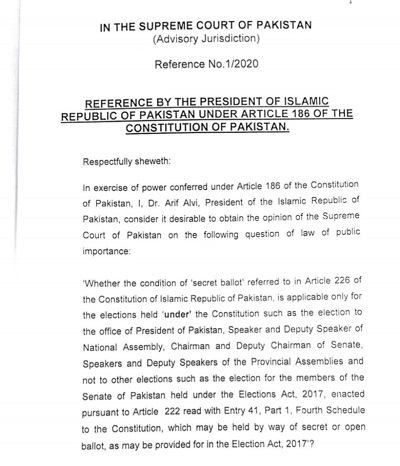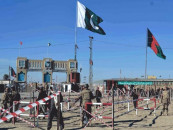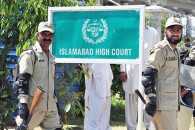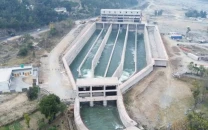Govt moves SC over Senate polls mode
Files reference seeking interpretation of Article 226
The PTI led federal government has filed a presidential reference to the Supreme Court, seeking guidance about holding the upcoming Senate polls through open ballot rather than secret ballot.
Attorney General for Pakistan (AGP) Khalid Javed Khan filed the reference on Wednesday under Article 186 of Constitution, invoking the court’s advisory jurisdiction.
The reference seeks interpretation of Article 226 which says all elections under the Constitution other than those of the prime minister and chief ministers shall be held through secret ballot.
It says interpretation of the Constitution and law is the exclusive domain of the judiciary with the Supreme Court as the final court.
“Through this instant reference, the opinion of this august court is requested on the legal question as to whether the elections for the members of the Senate do not fall with the elections held under the Constitution as envisaged in Article 226 of the Constitution with consequence that the voting could be held either open or secret ballot as may be provided in the Elections Act 2017 itself,” it says.
It asks if the condition of ‘secret ballot’ referred to in Article 226, is applicable only to the polls held “under” the Constitution – such as the election to the office of the president, the National Assembly speaker and deputy speaker, the Senate chairman and deputy chairman and speakers and deputy speakers of the provincial assemblies – and not to “other elections”.

PHOTO: EXPRESS
The reference states that there is national consensus amongst all major political parties, jurists and civil society that the electoral process should be cleansed of the pervasive practice of vote-buying in Senate elections.
The desire to stop vote buying through open ballot has manifested itself from time to time in the shape of political manifestos of major political parties, the Charter of Democracy executed in 2006 by two former prime ministers and respective heads of their political parties.
The federal government had decided to hold the Upper House polls in February and invoke the advisory jurisdiction of the apex court on the matter of open voting.
The elections will be held for 52 seats as many members of the 104-member Senate are due to retire on March 11. The proposal to seek the apex court's opinion under Article 186 of the Constitution was given by Attorney General Khalid Jawed Khan.
The merger of the erstwhile federally administered tribal areas and the emergence of the ruling party as the single largest party in the unified province has enhanced their chances of bagging the most seats in the upcoming senate elections next year.
Following the merger of the tribal districts with the settled districts of Khyber-Pakhtunkhwa (K-P), the number of provincial assembly members (MPAs) in the provincial assembly rose from 124 to 145.
This increase in seats in the provincial assembly came with a corresponding change in the formula set for securing seats in the senate elections with hopefuls now requiring more votes than in past elections to secure their seat.
With the Pakistan Tehreek-e-Insaf (PTI) holding around 94 seats in the house, it gives the party a good chance to fetch around five of the seats on its own. Even though the party is short one lawmaker, due to the death of their MPA from Nowshera, Jamshed Kakakhel, it still has more than enough members.
The ruling party also enjoys the support of two independent lawmakers including Faisal Zaman and Ihtisham Javed and the support of a Pakistan Muslim League-Quaid (PML-Q) lawmaker.
The opposition is in a position to win at least two seats given their combined numbers in the assembly with 41 MPAs. Being the largest parties in the opposition, the Jamiat Ulma-e-Islam-Fazl (JUI-F) and the Awami National Party (ANP) can secure one senate seat each with 15 and 12 seats each.
However, they will require support from the six Pakistan Muslim League-Nawaz (PML-N) and five Pakistan Peoples Party (PPP) and three Jamaat-e-Islami (JI) lawmakers.



















COMMENTS
Comments are moderated and generally will be posted if they are on-topic and not abusive.
For more information, please see our Comments FAQ